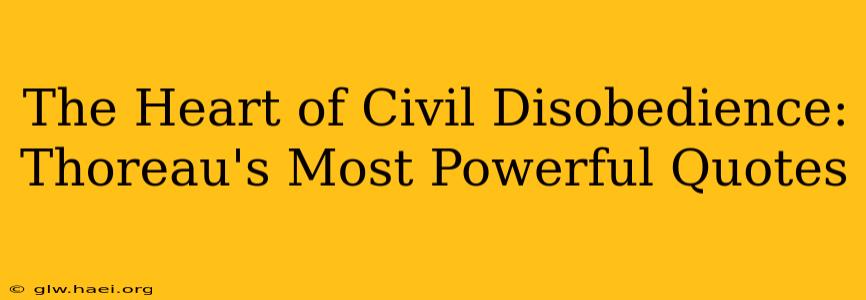The Heart of Civil Disobedience: Thoreau's Most Powerful Quotes
Henry David Thoreau, a transcendentalist writer and philosopher, left an indelible mark on the world with his radical ideas on civil disobedience. His essay, Civil Disobedience, published in 1849, resonated deeply with future generations of activists and continues to inspire movements for social justice. But what are the core tenets of Thoreau's philosophy, and which quotes best capture the spirit of his revolutionary thinking? Let's delve into some of his most powerful and enduring statements.
Thoreau's philosophy wasn't simply about rebelling; it was about a conscientious and moral objection to unjust laws. He believed that individuals have a moral duty to resist unjust laws and government actions, even if it means facing imprisonment. This wasn't a call to anarchy, but rather a call for a higher form of conscience, a principled stand against the erosion of individual liberty.
What is the main idea of Civil Disobedience by Thoreau?
This is a central question that many grapple with when first encountering Thoreau's work. The main idea hinges on the idea that individuals have a moral obligation to disobey unjust laws. It's not a blanket rejection of all laws, but rather a selective refusal to comply with those that violate fundamental principles of justice and morality. Thoreau argued that a truly just government must respect the conscience of its citizens and allow for dissent. He believed that following an unjust law passively legitimized that injustice. The individual conscience, according to Thoreau, should be the ultimate arbiter of right and wrong.
What are some of Thoreau's key arguments in Civil Disobedience?
Thoreau’s arguments are multifaceted and interconnected. He meticulously articulates several core points. He argues that the government is not always just and that citizens have a moral obligation to resist unjust laws. He uses the example of slavery as a blatant injustice that demands active resistance. He also underscores the importance of individual conscience over blind obedience to authority. He champions the power of the individual to challenge the status quo, even if it leads to imprisonment, and advocates for a government that respects individual liberty and conscience. Crucially, his essay isn't just a theoretical exploration; it's a call to action, urging readers to live their beliefs and actively participate in shaping a more just society.
What is the significance of Thoreau's Civil Disobedience?
The significance of Thoreau's Civil Disobedience extends far beyond its initial publication. His essay became a cornerstone of the philosophy of nonviolent resistance, deeply influencing figures like Mahatma Gandhi and Martin Luther King Jr. Gandhi adopted Thoreau's ideas in leading India's independence movement, while King utilized the principles of civil disobedience in the American Civil Rights Movement. The essay's enduring impact lies in its unwavering emphasis on individual conscience, moral responsibility, and the power of nonviolent resistance to effect social change. It provides a framework for challenging oppressive systems without resorting to violence, highlighting the crucial role of individual action in creating a more just and equitable world. This framework continues to be relevant today in various social and political struggles across the globe.
What are some of Thoreau's most powerful quotes on civil disobedience?
Let's now explore some of Thoreau’s most potent quotes, encapsulating the essence of his revolutionary philosophy:
-
"If the machine of government is of such a nature that it requires you to be the agent of injustice to another, then, I say, break the machine." This quote encapsulates the core of Thoreau's argument – when the government itself becomes the instrument of injustice, it becomes the duty of the citizen to actively disrupt its function.
-
"That government is best which governs least." This quote expresses Thoreau's belief in limited government and the importance of individual liberty. He advocated for a government that interfered minimally in the lives of its citizens.
-
"I heartily accept the motto,—'That government is best which governs least'; and I should like to see it acted up to more rapidly and systematically. Carried out, it finally amounts to this, which also I believe,—'That government is best which governs not at all'; and when men are prepared for it, that will be the kind of government which they will have." This quote expands on the previous one, suggesting the ultimate goal is a government that doesn't govern at all, implying a society capable of self-governance.
-
"Cast your whole vote, not a strip of paper merely, but your whole influence." This quote emphasizes the importance of active participation beyond mere symbolic gestures. It calls for a complete and unwavering commitment to one's beliefs.
-
"Under a government which imprisons any unjustly, the true place for a just man is also a prison." This statement highlights the moral imperative to stand alongside those unjustly imprisoned, even if it means sharing their fate.
Thoreau's words continue to resonate today, reminding us of the enduring power of individual conscience and the importance of actively challenging injustice. His legacy lives on not just in the pages of his essay, but in the countless acts of civil disobedience inspired by his profound and enduring ideas.

